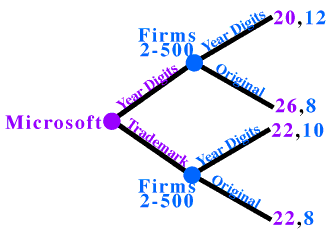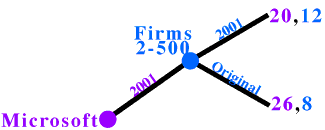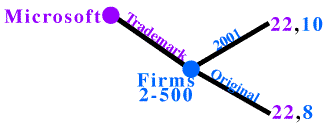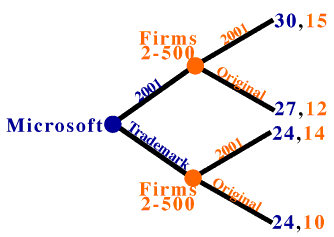
The firms who add 98 to product names hope to benefit from the advertising blitzkrieg (and subsequent media sucking up) that can be expected to accompany the release of Windows 98. We can view this as a sequential game played between Microsoft and other firms; with Microsoft making the first move, announcing the name of its new operating system a year or more in advance of its release. Hundreds of other firms then make the second move, by choosing a product name which they hope will create a positive association in potential customers' minds.
You may find it helpful to review the Oligopoly section on Sequential Games before proceeding.

Suppose the game tree, shown to the right, illustrates the kind of game being played. Payoffs are the numbers to the far right. The first number in each pair is Microsoft's payoff, and the second is the payoff to any one of the 500 firms who will add 98 to the end of their product's name.
In general, each firm has two strategies. Use the year digits as part of the product name or use a name that can be entirely protected by a trademark (in the case of the other firms we call this strategy original, because they might actually have to think of an original product name). The current version of the game has already been played. Microsoft announced Windows 98, and companies are rushing to add 98 to the end of product names.
If our game tree is correct, why did Microsoft allow this to occur? Most likely, because they didn't anticipate the sudden rush to add 98 to the end of the names of a number of products. After all, this didn't happen (that I'm aware of anyway) when Windows 95 was released. The real question is, how will the game be played in the future? Let's analyze the game based on the tree above.

As always, we solve such games via backwards induction. Suppose, the next operating system from Microsoft is Windows 2001 (after all, a name like Windows 01 won't inspire any confidence). This puts them on the upper branch of the tree as shown to the left. If Firms 2-500 find themselves here they will naturally name their products with the 2001 suffix since this yields a payoff of 12, while coming up with an original name only yields a payoff of 8. Therefore, if Microsoft uses the 2001 suffix, its payoff will be 20.

If Microsoft chooses to go with a name which can be entirely trademarked for its next version of Windows, this puts firms on the lower branch of the game tree where Microsoft is indifferent to what other firms choose. Either way, it will earn a payoff of 22, since other firms using year digits won't affect Microsoft marketing.
So, if our game tree is correct, for the rest of this year more and more products will be named with the 98 suffix, and the next version of Windows (after Windows 98), will not be given a name that is so easily imitated.

Suppose our game tree is wrong. Payoffs could be like those on the game tree shown to the left. A quick backwards induction check of this game reveals a different play for Microsoft. If the other Firms 2-500 find themselves on the top branch of the tree they will name their products using 2001 and Microsoft will earn a payoff of 30. If they find themselves on the lower portion of the tree they will still use 2001 but Microsoft's payoff will only be 24. If this is the way the game looks then expect the next version of Windows to be named Windows 2001 or Windows 2002. This probably isn't the case, Microsoft will probably find that this imitation dilutes the usefulness of its naming approach.
Update (April, 2000): As it turns out, we were both right and wrong in our predictions. We were wrong that Microsoft would abandon naming its OS by the year in which it is released. However, we were right in that they abandonded this naming convention for their consumer level OS. What they have chosen to do is even more confusing than anything we could have imagined. Windows 2000 is the upgrade product for Windows NT users, while Windows Millennium is the upgrade product for Windows 98 users.
Copyright © 1995-2003 OnLineTexts.com, Inc. - All Rights Reserved